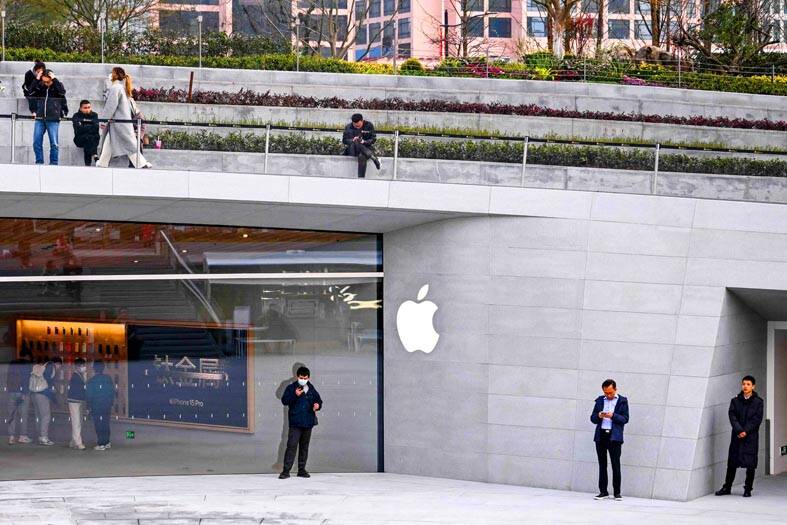Apple Inc removed social media services such as Meta Platforms Inc’s WhatsApp and Threads from its Chinese app store, complying with orders from Beijing to close more loopholes in the country’s longstanding Internet firewall.
It also removed messaging services Telegram and Signal, consultants tracking the space said.
The Cyberspace Administration of China ordered the apps removed over national security concerns, said Apple, which has consistently complied with one of the world’s most rigid Internet censorship regimes.

Photo: AFP
The orders are part of a cleanup program Chinese regulators initiated last year, which would remove many defunct or unregistered apps from domestic iOS and Android stores, including local ones. In August last year, China asked all mobile app developers to register with the government by the end of last month or cease operations.
Beijing has barred the use of foreign messaging and social media platforms like WhatsApp for years, using what the industry calls the Great Firewall. That has helped apps like Tencent Holdings Ltd’s WeChat dominate domestic usage, though Chinese users can still use virtual private networks to view foreign media.
Less sensitive apps with more substantial Chinese businesses such as learning app Duolingo are expected to comply with the latest regulatory licensing regime to remain operational, AppInChina co-founder and CEO Rich Bishop said.
“It will mean that Chinese consumers are pretty much limited to just Chinese apps, with a small number of international ones,” said Bishop, whose consultancy has received dozens of inquiries from companies about how to stay compliant and publish software in China. “That’s quite a big change — so it will further cut off Chinese citizens from the rest of the world in a sense.”
The action against US tech services comes as it takes steps toward banning TikTok, the hit video app under Beijing-based ByteDance Ltd. US politicians have also cited national security concerns in their push to force the company to either sell TikTok to a non-Chinese owner or face a ban in the US.
“We are obligated to follow the laws in the countries where we operate, even when we disagree. The Cyberspace Administration of China ordered the removal of these apps from the China storefront based on their national security concerns,” Apple said in a statement. “These apps remain available for download on all other storefronts where they appear.”
The app registration process kicked off last year in what Beijing painted as a bid to counter telephone scams and fraud.
The Ministry of Industry and Information Technology said that it would carry out supervision work on those filings from April to June and take action against unregistered apps, adding that developers would also be required to set up and improve mechanisms to handle “illegal information.”
The move was regarded as another step by Beijing to tighten controls across its cyberspace, forcing Internet companies to scrub information considered politically sensitive. Beyond apps, Web sites and large language artificial intelligence models have also been subject to greater content curbs.

CHIP RACE: Three years of overbroad export controls drove foreign competitors to pursue their own AI chips, and ‘cost US taxpayers billions of dollars,’ Nvidia said China has figured out the US strategy for allowing it to buy Nvidia Corp’s H200s and is rejecting the artificial intelligence (AI) chip in favor of domestically developed semiconductors, White House AI adviser David Sacks said, citing news reports. US President Donald Trump on Monday said that he would allow shipments of Nvidia’s H200 chips to China, part of an administration effort backed by Sacks to challenge Chinese tech champions such as Huawei Technologies Co (華為) by bringing US competition to their home market. On Friday, Sacks signaled that he was uncertain about whether that approach would work. “They’re rejecting our chips,” Sacks

Taiwan’s exports soared 56 percent year-on-year to an all-time high of US$64.05 billion last month, propelled by surging global demand for artificial intelligence (AI), high-performance computing and cloud service infrastructure, the Ministry of Finance said yesterday. Department of Statistics Director-General Beatrice Tsai (蔡美娜) called the figure an unexpected upside surprise, citing a wave of technology orders from overseas customers alongside the usual year-end shopping season for technology products. Growth is likely to remain strong this month, she said, projecting a 40 percent to 45 percent expansion on an annual basis. The outperformance could prompt the Directorate-General of Budget, Accounting and

NATIONAL SECURITY: Intel’s testing of ACM tools despite US government control ‘highlights egregious gaps in US technology protection policies,’ a former official said Chipmaker Intel Corp has tested chipmaking tools this year from a toolmaker with deep roots in China and two overseas units that were targeted by US sanctions, according to two sources with direct knowledge of the matter. Intel, which fended off calls for its CEO’s resignation from US President Donald Trump in August over his alleged ties to China, got the tools from ACM Research Inc, a Fremont, California-based producer of chipmaking equipment. Two of ACM’s units, based in Shanghai and South Korea, were among a number of firms barred last year from receiving US technology over claims they have

BARRIERS: Gudeng’s chairman said it was unlikely that the US could replicate Taiwan’s science parks in Arizona, given its strict immigration policies and cultural differences Gudeng Precision Industrial Co (家登), which supplies wafer pods to the world’s major semiconductor firms, yesterday said it is in no rush to set up production in the US due to high costs. The company supplies its customers through a warehouse in Arizona jointly operated by TSS Holdings Ltd (德鑫控股), a joint holding of Gudeng and 17 Taiwanese firms in the semiconductor supply chain, including specialty plastic compounds producer Nytex Composites Co (耐特) and automated material handling system supplier Symtek Automation Asia Co (迅得). While the company has long been exploring the feasibility of setting up production in the US to address